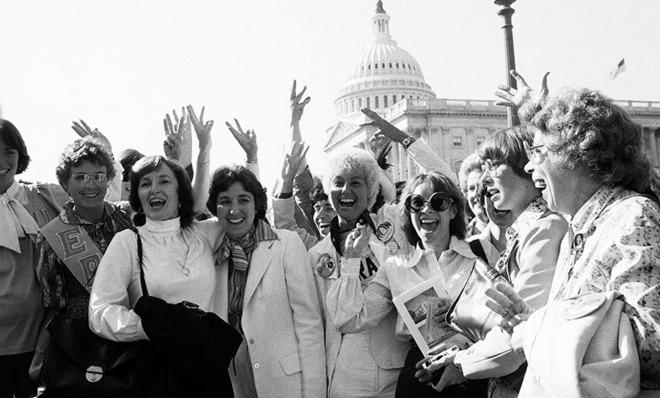Why feminists should cheer the feminism backlash
It's time for the movement to get back to business


A free daily email with the biggest news stories of the day – and the best features from TheWeek.com
You are now subscribed
Your newsletter sign-up was successful
Turns out feminism is not immune to the perils of popularity. The movement has become a media darling, rivaling Kim Kardashian for references in headlines and celebrity gossip. Fly that high and a backlash is inevitable.
The most recent example of this was a poll from Time magazine that included "feminist" along with "bossy" and "kale" on a list of words that should be banned in 2015. The whole thing screamed of a publicity stunt, but nevertheless the protests from feminists came pouring in. (Many were spot-on). What interests me however isn't how Time misstepped, but what, beyond misogyny, is fueling this backlash. Think of it as a teachable moment.
The preferred working definition used by feminists today is pretty innocuous: a belief in the social, economic, and political equality of the sexes. And really, aside from extremists, who could disagree? Except a belief in any movement or ideology is not enough; one must also act on it and that's where the trouble begins. Most of us are for equality. But we don't all agree on how to achieve it.
The Week
Escape your echo chamber. Get the facts behind the news, plus analysis from multiple perspectives.

Sign up for The Week's Free Newsletters
From our morning news briefing to a weekly Good News Newsletter, get the best of The Week delivered directly to your inbox.
From our morning news briefing to a weekly Good News Newsletter, get the best of The Week delivered directly to your inbox.
This is a problem because it goes against the all-inclusive public face of feminism that is so popular today. In an attempt to appeal to as wide an audience as possible, feminism has become more of an identity than a movement, a box that celebrities can check between talking about their pets and their love of cold-pressed juice.
One of the worst side-effects of this all-inclusive feminism has been the many existential and meta-debates about whether someone or something is truly feminist. For one, the chatter gets really annoying. But more importantly, they distract us from conversations about specific, actionable issues. We need less feminism for the sake of feminism, and more feminism for the sake of gender equality. I know the difference when I see it.
Los Angeles Times' columnist Meghan Daum recently wrote about how "too many internal skirmishes are diverting [feminists'] attention from the war on women to a war between women."
Yep. Some women think Renee Zellweger is a victim of the patriarchy and others think she is someone with bad taste in plastic surgery. Some see Mark Zuckerberg's comments on clothing as sexist, and others see criticizing his clothing as counter-productive. (I agree.) Some see breastfeeding until age three as the ultimate feminist act, and for others, formula is the go-to baby-food for the modern gal.
A free daily email with the biggest news stories of the day – and the best features from TheWeek.com
Such infighting is inevitable in any movement. What makes the stakes so much higher for feminists is that these arguments often quickly move from being about a specific issue to a battle over the heart and soul of feminism. This is an inevitable side-effect of viewing something as an identity and not a movement. With an identity, we get stuck on what it means to be a feminist because everyone's energy is put into figuring out some meta-narrative of what feminism is. With a movement, we think about what is to be done, and within that context there is psychic space for dissent.
So, what next?
We definitely don't get rid of the term feminism, as some have suggested, because movements and ideas need context even if they are constantly being debated. (See: All world religions.) That said, the anything-goes-as-long-as-you-believe-in-equality-feminism may have finally run its course, alongside it's free-market, libertarian-inspired sister, "choice-feminism" that The Onion so perfectly parodied a few years back. I say rest in peace to both of them.
This doesn't mean the feminist-curious should be dissuaded from identifying as feminists before they are sure about their politics. Just that it is okay to demand more from ourselves and the movement, even if it means projecting a less-inclusive definition of feminism.
We might stop asking celebrities if they are feminists and start asking them about specific issues like abortion rights, paid leave, or the wage gap. We also might stop being shocked when a woman says she is not a feminist, because we are aware that the liberal politics of feminism will never appeal to all women, whether because they lean too heavy on the government or contradict church teachings. I'm okay with that.
Let's take the current momentum, the one that earned us the backlash, and direct it towards the nitty gritty. We might lose a few famous, pretty faces, but we'll probably get a lot more done.
Elissa Strauss writes about the intersection of gender and culture for TheWeek.com. She also writes regularly for Elle.com and the Jewish Daily Forward, where she is a weekly columnist.
-
 6 of the world’s most accessible destinations
6 of the world’s most accessible destinationsThe Week Recommends Experience all of Berlin, Singapore and Sydney
-
 How the FCC’s ‘equal time’ rule works
How the FCC’s ‘equal time’ rule worksIn the Spotlight The law is at the heart of the Colbert-CBS conflict
-
 What is the endgame in the DHS shutdown?
What is the endgame in the DHS shutdown?Today’s Big Question Democrats want to rein in ICE’s immigration crackdown
